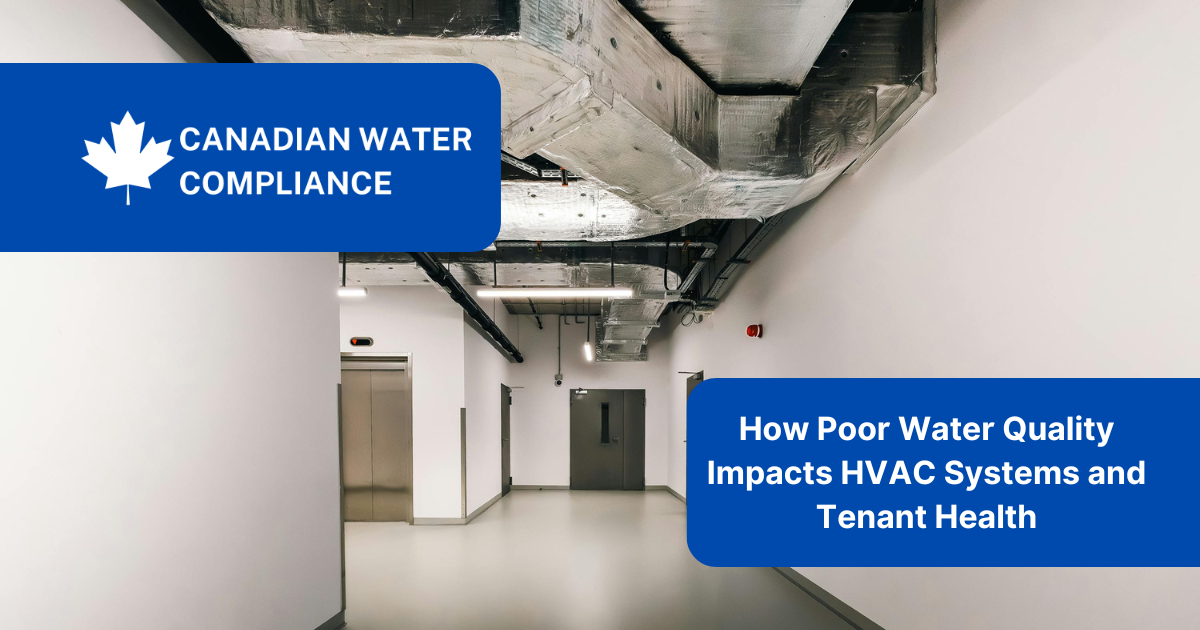
Written By: Canadian Water Compliance | On
In modern commercial and multi-residential buildings, HVAC (Heating, Ventilation, and Air Conditioning) systems are critical for maintaining a healthy and comfortable indoor environment. However, one factor that often goes overlooked in HVAC performance and indoor air quality is the quality of the water running through these systems. Poor water quality can severely impair HVAC operation, drive up energy costs, lead to equipment failure, and create serious health risks for tenants — including exposure to Legionella bacteria and other harmful pathogens.
Many HVAC systems rely on water for key functions such as cooling, heating, and humidification. Systems such as cooling towers, boilers, and evaporative condensers are especially susceptible to issues arising from untreated or poorly maintained water. Contaminants like corrosion products, biofilm, mineral scale, and bacteria can significantly compromise system efficiency and safety.
Without proper testing and treatment, poor water quality can lead to:
Reduced equipment lifespan: Corrosion and scaling can deteriorate internal components like heat exchangers and piping.
Operational inefficiencies: Fouled systems require more energy to maintain set temperatures and humidity levels.
Increased maintenance costs: Issues stemming from scale or microbial buildup require frequent repairs and cleanings.
Health risks: Contaminated water systems — especially cooling towers — can aerosolize dangerous pathogens like Legionella, which can cause Legionnaires’ disease.
The most well-documented public health risk tied to HVAC water systems is Legionella. This bacteria thrives in warm, stagnant water and is commonly found in cooling towers, hot water tanks, and evaporative condensers. If inhaled via aerosolized droplets, Legionella can cause Legionnaires’ disease — a potentially fatal form of pneumonia.
Outbreaks of Legionnaires’ disease are frequently traced back to buildings with poor water management practices, and property managers can be held legally responsible for negligence. In Ontario, the Ministry of Health and Public Health Ontario recommend regular Legionella testing in HVAC systems, and building owners may be subject to lawsuits or fines if their buildings are linked to an outbreak.
Even when pathogens aren’t present, other water quality issues can wreak havoc on building systems and tenant well-being:
Scale buildup from hard water reduces heat transfer efficiency, causing systems to work harder and use more energy.
Corrosion from improper pH or untreated water introduces rust and metals into the water stream, damaging mechanical parts.
Biofilm formation provides a breeding ground for bacteria and reduces system efficiency.
Particulate fouling clogs valves and reduces flow, impairing performance.
These conditions often result in uneven heating and cooling, poor indoor air quality, and uncomfortable or unhealthy living and working environments for tenants.
Under Ontario’s Occupational Health and Safety Act, employers — including property managers — have a legal duty to maintain healthy environments for tenants and building staff. Neglecting HVAC water systems can not only lead to insurance issues but also open property owners to liability if tenant health is compromised.
Proactive water quality management should be considered part of a building’s compliance, risk mitigation, and tenant retention strategy. It also helps demonstrate diligence and concern for public health during any inspection or incident investigation.
To safeguard HVAC system integrity and tenant health, building managers should implement the following best practices:
Routine water testing for Legionella, pH, conductivity, metals, and microbial growth
Water treatment programs including biocides, scale inhibitors, and corrosion protection
Filtration systems to remove particulates before they circulate through mechanical equipment
Flushing schedules and maintenance logs to keep water systems clean and functional
Third-party validation of water treatment performance through accredited laboratories
Water quality testing should be performed at least quarterly, and more frequently for high-risk systems such as cooling towers and large boilers.
Canadian Water Compliance provides comprehensive HVAC system water testing, including certified sampling, accredited laboratory analysis, and tailored reporting for property owners and managers across Ontario. Our experts can help identify system vulnerabilities, assess Legionella risk, and support the implementation of compliant water management programs.
Protecting your HVAC infrastructure and your tenants’ health begins with knowing what’s in your water. Let us help you stay ahead of costly damage and legal risks through proactive water quality testing and compliance-focused strategies.